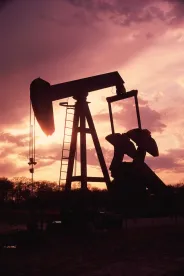In yet another example of the U.S. Environmental Protection Agency (EPA’s) “sue and settle” approach to regulation, in late December 2016, EPA entered into a Consent Decree with an environmental group and agreed to reconsider the Agency’s current treatment of oil and gas wastes under the federal Resource Conservation and Recovery Act (RCRA). See Consent Decree, Civil Action No. 16-842. With the D.C. District Court’s approval of this Consent Decree, EPA is now bound to a court imposed timeline for determining (1) how oil and gas wastes should be regulated under RCRA Subtitle D; and (2) whether the RCRA state plan guidelines pertaining to oil and gas wastes should be revised. EPA has until March 2019 to make its determination, which means the Trump Administration EPA will have yet another pressing issue on its plate to deal with over the next four years.
Background on RCRA Treatment of Oil and Gas Wastes
Despite widespread assertions by environmental groups that the oil and gas industry is subject to a series of exemptions from environmental law, oil and gas wastes are in fact regulated under the federal RCRA statute. Wastes associated with the exploration for and production of oil and gas are subject to RCRA Subtitle D regulations for non-hazardous wastes and state regulatory programs. See EPA RCRA Exemption of Oil and Gas Exploration and Production Wastes. The “exemption” environmental groups have sought to repeal was simply a regulatory determination EPA previously has made that the relative large volume of oil and gas wastes are lower in toxicity and thus should not be subject to the same strict requirements hazardous wastes are under Subtitle C.
Back in the late 1980s and in accordance with RCRA, EPA studied oil and gas wastes and concluded that regulation of oil and gas wastes under Subtitle C was inappropriate. EPA looked at three key factors in making its determination: (1) The characteristics, management practices, and resulting impacts of the wastes on human health and the environment; (2) the adequacy of existing State and Federal regulatory programs; and (3) the economic impacts of any additional regulatory controls on industry. Generally, EPA found that at the time existing State and Federal regulations were adequate to control the wastes and that subjecting oil and gas wastes to Subtitle C regulation would cause “a severe economic impact on the industry and on oil and gas production in the U.S.” See EPA. Regulatory Determination for Oil and Gas and Geothermal Exploration, Development and Production Wastes. 53 Fed. Reg. 25,446 (July 6, 1988).
EPA identified numerous problems with regulating oil and gas wastes under Subtitle C, including the limited flexibility of the regulatory framework to take into account “the varying geological, climatological, geographic, and other differences characteristic of oil and gas drilling and production sites across the country.” Id. at 25,447. EPA reasoned that because the Federal and State regulatory framework for managing oil and gas wastes was generally sufficient, the Agency need only improve the current management of such wastes with “targeted” gap-filling. Under this approach, EPA could strengthen management of oil and gas wastes by using RCRA Subtitle D regulations applicable to non-hazardous wastes and via improvements to the Clean Water Act and Safe Drinking Water Act Underground Injection Control program, instead of imposing the unnecessary and costly Subtitle C requirements.
The Citizen Suit and Impact of the Consent Decree
Relying on the RCRA citizen suit provision, environmental groups sued EPA in May 2016 citing what they characterized as a failure by EPA to meet its nondiscretionary duties to review every three years the Subtitle D regulations for oil and gas wastes and state solid waste management plans. Their claim rested on a 2013 DC Circuit case holding that RCRA § 2002(b) requires EPA to review and revise RCRA regulations every three years. See Appalachian Voices v. McCarthy, 989 F. Supp. 2d 30, 45 (D.D.C. 2013). In just a short six months since that citizen suit was filed, EPA entered into the Consent Decree. Now, EPA has committed to a two year timeline to either revise the Subtitle D regulations as they apply to oil and gas wastes or sign a determination that no revision is necessary. If EPA determines a revision of the Subtitle D regulations is required, it must commence notice and comment rulemaking no later than July 2021.
It is unlikely that EPA can reasonably reach a different conclusion than it did in its 1988 Determination, especially considering the gap-fillers that are now in place at the federal level in the Clean Water Act, the SDWA and the Oil Pollution Act of 1990 (OPA) and the overall success and evolution of state oil and gas regulatory programs across the U.S. State regulators have undertaken major changes in oil and gas programs over the past 30 years. They are attuned to the unique issues industry experiences in their backyard, they have demonstrated a remarkable ability to adapt with industry, and are typically more nimble than their federal counterparts in rolling out new programs. Considering this and with a Trump Administration on the horizon, EPA may have a difficult time justifying a complete reversal from the 1988 Determination.





 />i
/>i
